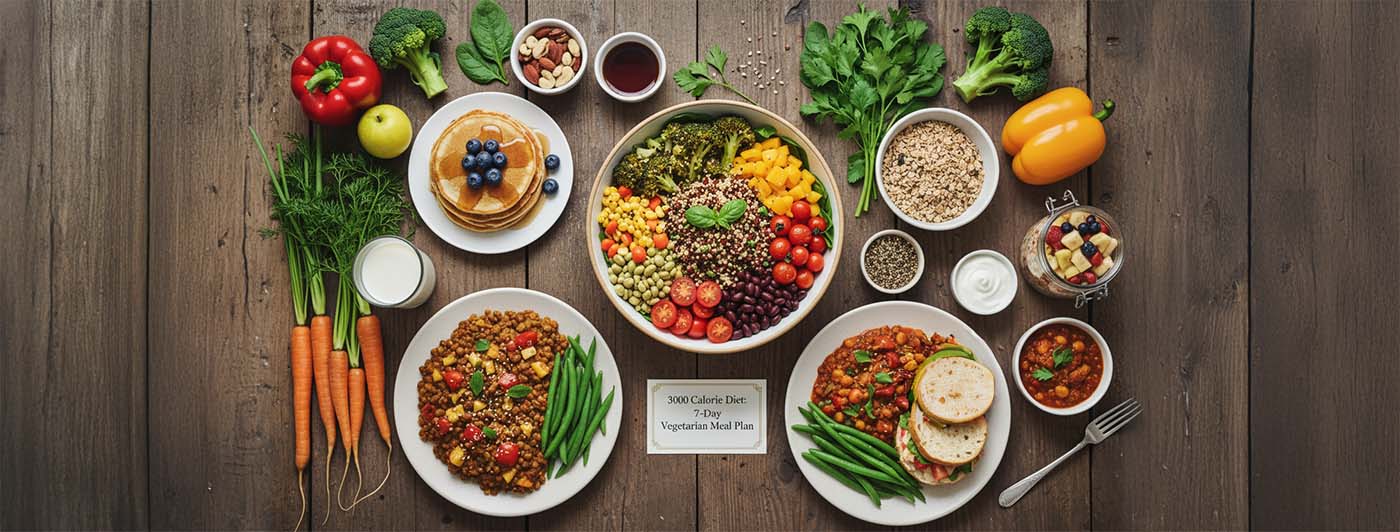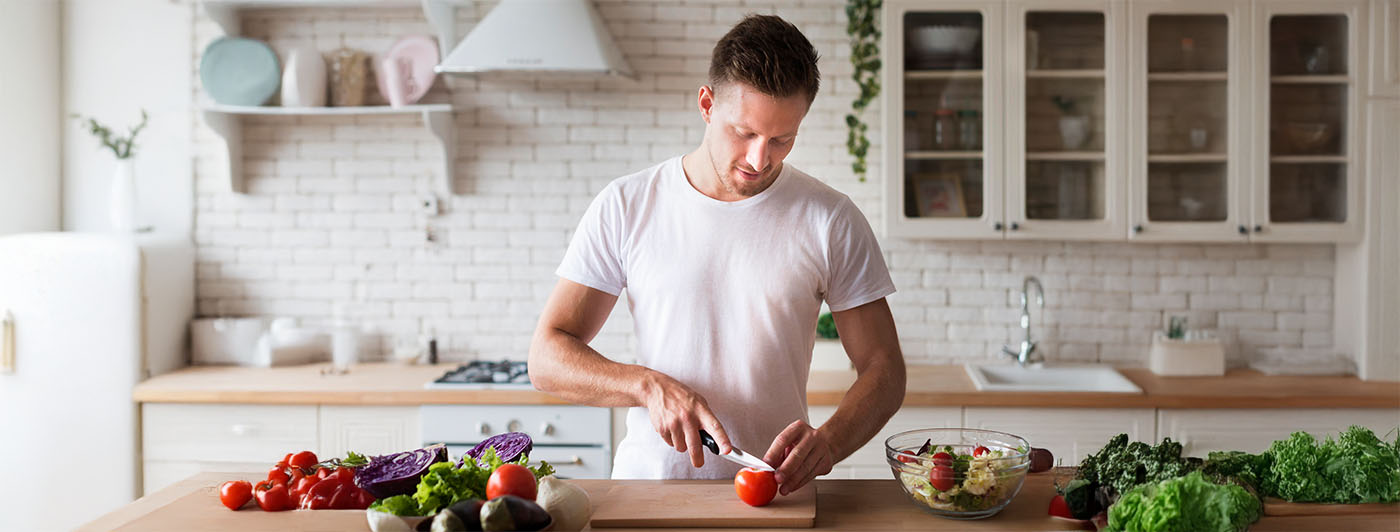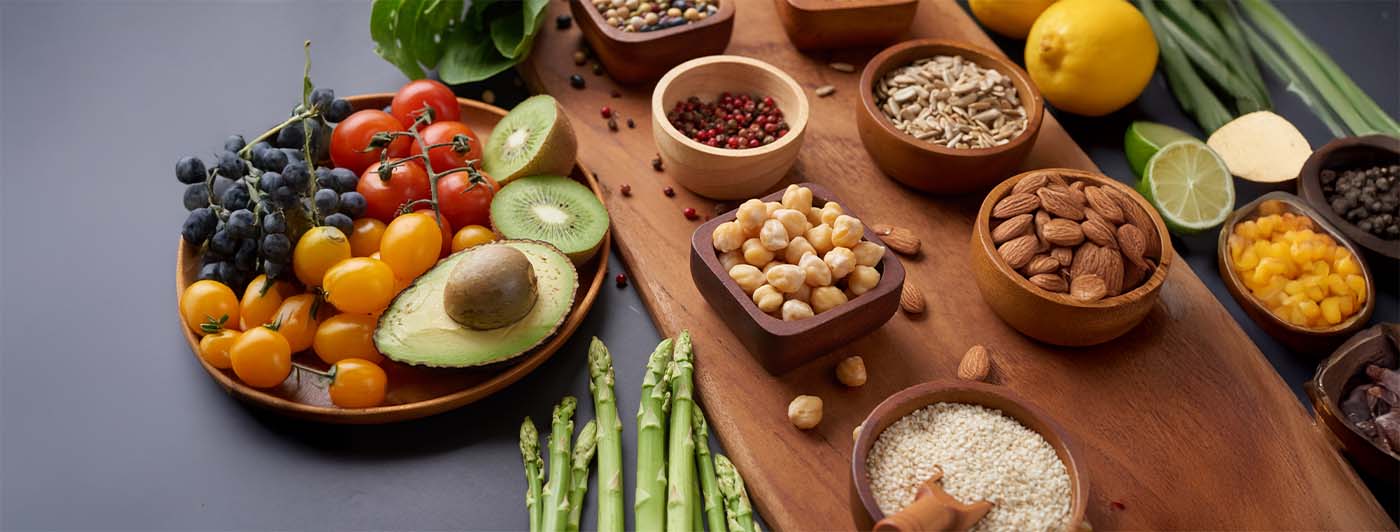Ever wondered how bodybuilders, athletes, and fitness enthusiasts manage to eat 3000 calories a day and still stay lean? The secret lies in smart planning — fueling your body with the right mix of whole foods, quality carbs, healthy fats, and clean plant protein sources that don’t weigh you down.
If you’re trying to gain healthy weight, build muscle, or simply fuel an active lifestyle, a 3000 calorie diet can be the sweet spot. But for vegetarians, getting those calories right — with a balance of protein, carbs, and healthy fats — can feel tricky. This guide breaks down everything you need to know: from daily meal plans to the science behind calorie distribution and macronutrients.
Understanding the Basics of a 3000 Calorie Diet
A 3000 calorie diet is typically recommended for men and women with high physical activity levels, fast metabolism, or those trying to increase lean muscle mass. The aim is not just to eat more food — it’s to eat smarter. Quality calories matter more than quantity.
Here’s a quick macronutrient split for your 3000 calorie diet:
-
Carbohydrates: 50% (about 375 g)
-
Protein: 20% (about 150 g)
-
Fats: 30% (about 100 g)
If you’re not sure how much protein you actually need, try using a protein intake calculator — it helps tailor the numbers to your body type, goals, and workout routine.
The Science Behind Weight Gain on a Vegetarian Diet
Most people associate weight gain with junk food, but healthy weight gain comes from nutrient-dense whole foods — grains, legumes, nuts, and seeds. These foods provide steady energy, essential amino acids, and micronutrients.
For example, a review of whole-food, plant-based eating patterns found these diets — rich in legumes and other minimally-processed plant-source foods — support improved nutrient adequacy and healthier body composition. Supplements can support your progress too, but your core calories should come from real food.
Protein Sources You Can Rely On
Vegetarians can meet their protein requirements through a smart mix of lentils, chickpeas, tofu, tempeh, paneer, and dairy. A scoop of plant based protein powder after a workout can also help bridge any gaps in your daily intake. For those focusing on clean nutrition, pea protein powder is a great choice — it’s hypoallergenic, rich in BCAAs, and easy to digest.
7-Day 3000 Calorie Diet Chart for Vegetarians
Below is a sample 3000 calorie diet plan for one week, designed to ensure variety and taste without compromising on nutrients. You can rotate meals or adjust portions as per your appetite and activity level.
Day 1
-
Breakfast: Overnight oats with almond milk, banana, peanut butter, and chia seeds for weight gain.
-
Mid-Morning Snack: Mixed nuts and a glass of mango smoothie.
-
Lunch: Brown rice, rajma curry, vegetable salad with olive oil dressing.
-
Evening Snack: Roasted chickpeas with a cup of green tea.
-
Dinner: Paneer tikka, whole-wheat roti, sautéed spinach.
Day 2
-
Breakfast: Two boiled eggs (or tofu scramble for pure vegetarians), avocado toast.
-
Snack: A handful of walnuts and dates.
-
Lunch: Quinoa pulao, curd, and mixed vegetables.
-
Pre-Workout: Banana shake with honey.
-
Post-Workout: Protein smoothie made with oats, almond butter, and plant protein.
-
Dinner: Palak paneer, millet roti, cucumber raita.
Day 3
-
Breakfast: Vegetable paratha with curd and a fruit bowl.
-
Snack: Corn chaat and coconut water.
-
Lunch: Moong dal khichdi, ghee, papad, and salad.
-
Evening Snack: Hummus with carrot sticks.
-
Dinner: Mixed lentil curry, basmati rice, stir-fried broccoli.
Day 4
-
Breakfast: Muesli with milk, almonds, raisins, and sliced apple.
-
Snack: Homemade granola bar with flaxseeds.
-
Lunch: Paneer bhurji, brown rice, and sautéed beans.
-
Pre-Workout: Banana with peanut butter.
-
Post-Workout: Smoothie with oats, cocoa, and a spoon of weight loss powder for women (if you’re managing calorie distribution smartly).
-
Dinner: Dal tadka, roti, beetroot salad.
Day 5
-
Breakfast: Upma with vegetables and peanuts.
-
Snack: Buttermilk and roasted makhana.
-
Lunch: Chickpea curry, rice, and carrot-cabbage salad.
-
Evening Snack: Apple slices with almond butter.
-
Dinner: Veg biryani with raita and papad.
Day 6
-
Breakfast: Idli with sambar and chutney.
-
Snack: Handful of cashews and banana.
-
Lunch: Rajma-chawal with ghee drizzle.
-
Evening Snack: Greek yogurt with berries.
-
Dinner: Tofu curry, brown rice, and sautéed kale.
Day 7
-
Breakfast: Oats pancake with honey and nuts.
-
Snack: Fresh juice or smoothie.
-
Lunch: Veg fried rice with paneer manchurian.
-
Evening Snack: Popcorn or other zero calorie snacks if you’re full but crave crunch.
-
Dinner: Dal makhani, jeera rice, salad with olive oil dressing.
Micronutrient Powerhouses for a 3000 Calorie Diet
A 3000 calorie diet isn’t just about macros — micros matter too. You need vitamins, minerals, and antioxidants for energy production and recovery. Foods rich in iron, zinc, and B-vitamins are particularly important for vegetarians.
Include These Daily:
-
Spinach, kale, and moringa: Great for iron and calcium.
-
Pumpkin seeds and almonds: Excellent for magnesium and zinc.
-
Berries and citrus fruits: High in antioxidants and vitamin C.
Strength Training + Nutrition: The Perfect Pair
A 3000 calorie diet supports muscle growth only when paired with resistance training. Include compound exercises like squats, pull-ups, and the decline bench press to stimulate multiple muscle groups. Strength training also enhances nutrient partitioning — your body utilizes calories more efficiently, leading to lean gains rather than fat storage.
For optimal recovery, pay attention to creatine and amino acid intake. Include creatine rich foods like paneer, pumpkin seeds, and tofu. While vegetarians get less creatine naturally, supplementation or creatine-boosting foods can help increase power and endurance.
Special Add-Ons for Enhanced Results
Let’s look at some unique additions that amplify your 3000 calorie diet progress:

-
L-tartrate benefits: L-carnitine L-tartrate helps in faster recovery and reduced muscle soreness. It’s often used by athletes to enhance endurance and muscle repair.
-
Best DHT blocker food: If you’re worried about hair loss from increased testosterone, add pumpkin seeds or green tea — both are natural DHT blockers that help maintain healthy hair.
-
Chia seeds for weight gain: These tiny seeds are calorie-dense and loaded with omega-3s and fiber. Mix them into smoothies, puddings, or breakfast bowls.
-
Pea protein powder: An easy way to up your daily protein without relying on dairy, ideal for post-workout shakes.
Avoiding Common Mistakes in a 3000 Calorie Diet
Even with the best intentions, many vegetarians make avoidable errors. Watch out for these pitfalls:
1. Ignoring Protein Distribution
Don’t load all your protein in one meal. Split it evenly across 4–5 meals to optimize muscle protein synthesis.
2. Overeating Empty Calories
A 3000 calorie diet should prioritize nutrient-dense foods. Replace sugary drinks and fried snacks with whole grains, fruits, and nuts.
3. Neglecting Digestive Health
High-calorie diets can cause bloating. Include probiotics like curd and fiber from fruits and veggies for gut balance.
4. Missing Out on Healthy Fats
Fats are calorie-dense and help you hit your target easily. Use olive oil, avocado, nuts, and seeds generously — they provide sustained energy and support hormone health.
How to Customize Your 3000 Calorie Diet
Everyone’s calorie needs differ based on metabolism, activity, and body composition. If your goal is to bulk up, gradually increase calories by 300–500 per day rather than jumping straight to 3000 calorie diet levels.
To fine-tune your plan:
-
Use a protein intake calculator to get precise targets.
-
Track your weight every week.
-
Ensure at least 7–8 hours of sleep for muscle repair.
Also, hydration plays a crucial role — drink 3–4 liters of water daily, especially around workouts.
Smart Snack Swaps
Snacking can make or break your progress. Instead of fried foods or sweets, pick these calorie-smart yet nutrient-dense options:
-
Trail mix with almonds, raisins, pumpkin seeds.
-
Smoothies with oats, banana, and almond butter.
-
Homemade energy bars with dates and flaxseeds.
-
Roasted chickpeas instead of chips.
If you still crave munchies at night, go for zero calorie snacks like air-popped popcorn or cucumber slices with seasoning.
Why a Structured Plan Matters
A haphazard approach often leads to excess fat gain. Following a structured 3000 calorie diet ensures balance — it gives your body a consistent nutrient supply for recovery, strength, and endurance. Over time, you’ll notice increased energy, improved performance, and a healthier appetite.
Vegetarians often underestimate the power of diversity. By combining pulses, grains, dairy, seeds, and superfoods, you can easily meet — and exceed — your calorie and nutrient goals. In fact, a 2024 review of plant-based diets concluded that “scaled plant-based diets satisfy protein requirements for maximizing resistance-exercise-training-induced gains in muscle mass and strength.”
Supplements That Complement a Vegetarian 3000 Calorie Diet
While food should remain your foundation, certain supplements can help:
-
Multivitamin: Fills micronutrient gaps.
-
Omega-3 (algae-based): Supports heart and brain health.
-
Creatine: Improves strength and muscle volume.
-
Plant based protein powder: Ensures daily protein consistency.
These are not replacements, but enhancers for your 3000 calorie diet journey.
The Bottom Line
Following a 3000 calorie diet as a vegetarian isn’t as difficult as it sounds. It’s about planning, variety, and nutrient density. Balance your macros, stay active, and fuel your body with wholesome meals. Add superfoods like chia seeds for weight gain, leverage the l tartrate benefits for better recovery, and train smart with exercises like the decline bench press to build strength effectively.
Remember — calories are just numbers; the quality of those calories defines your transformation. Pair your 3000 calorie diet with mindful eating, good sleep, and consistency, and your body will thank you with strength, stamina, and visible muscle gain.
To accelerate your progress, consider complementing your meals with a clean, balanced Plantigo Plant Protein shake — formulated from natural ingredients and designed to help you meet your daily protein goals the smart way.
Start your transformation today — nourish, train, and grow stronger every single day.
Frequently Asked Questions
1. Who should follow a 3000 calorie diet?
A 3000 calorie diet is best suited for individuals with high physical activity levels, such as athletes, fitness enthusiasts, or those looking to gain muscle or healthy weight. It helps maintain energy balance while supporting muscle growth and recovery.
2. Can vegetarians get enough protein on a 3000 calorie diet?
Yes, absolutely. A vegetarian 3000 calorie diet can provide ample protein through foods like lentils, chickpeas, tofu, paneer, tempeh, and dairy. You can also include plant based protein powder or pea protein powder to easily meet your daily protein target.
3. Will a 3000 calorie diet make me gain fat?
Not if you follow a structured meal plan and include strength training. The key is focusing on nutrient-dense foods rather than junk calories. A well-balanced 3000 calorie diet helps build lean muscle instead of fat.
4. How do I track my calories on a 3000 calorie diet?
Use a calorie tracker app and a protein intake calculator to monitor your macronutrients. It ensures your 3000 calorie diet stays balanced between carbs, proteins, and fats — helping you achieve steady, healthy progress.
5. Can I customize the 3000 calorie diet for my goals?
Yes. Start by adjusting portions and adding or removing 300–500 calories based on your goals — whether it’s bulking, maintaining, or slow weight gain. Always combine your 3000 calorie diet with good sleep, hydration, and consistent workouts for best results.












